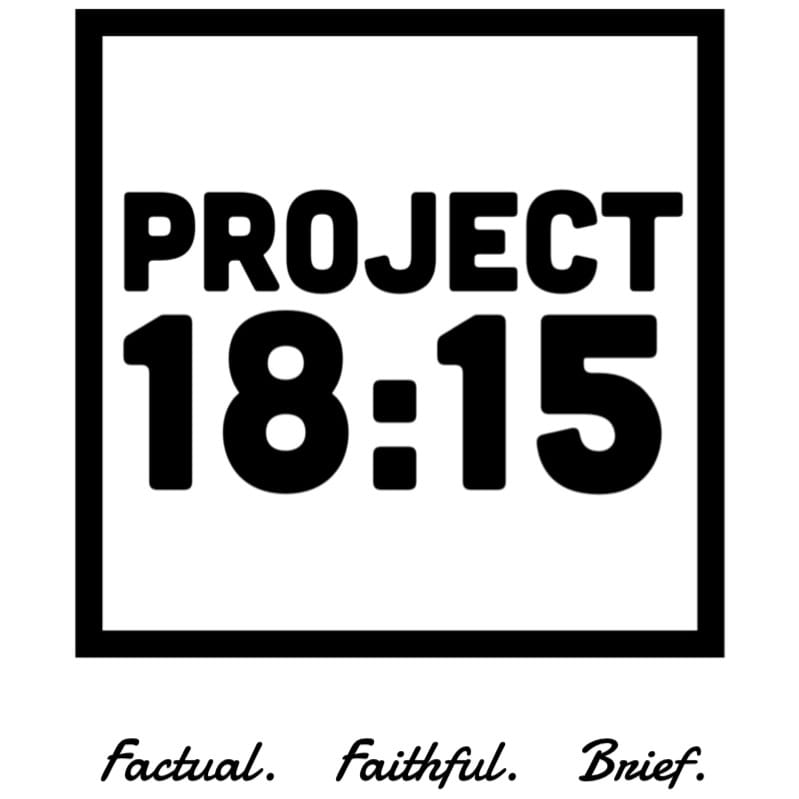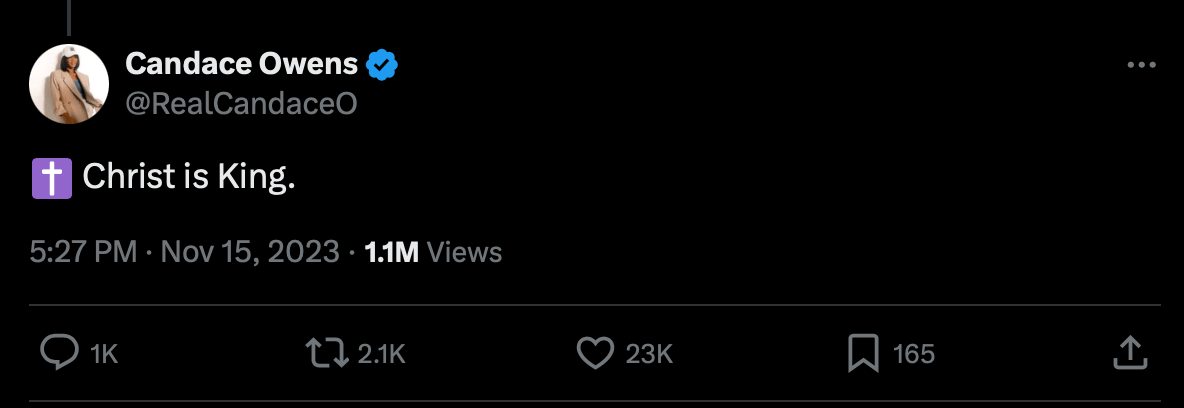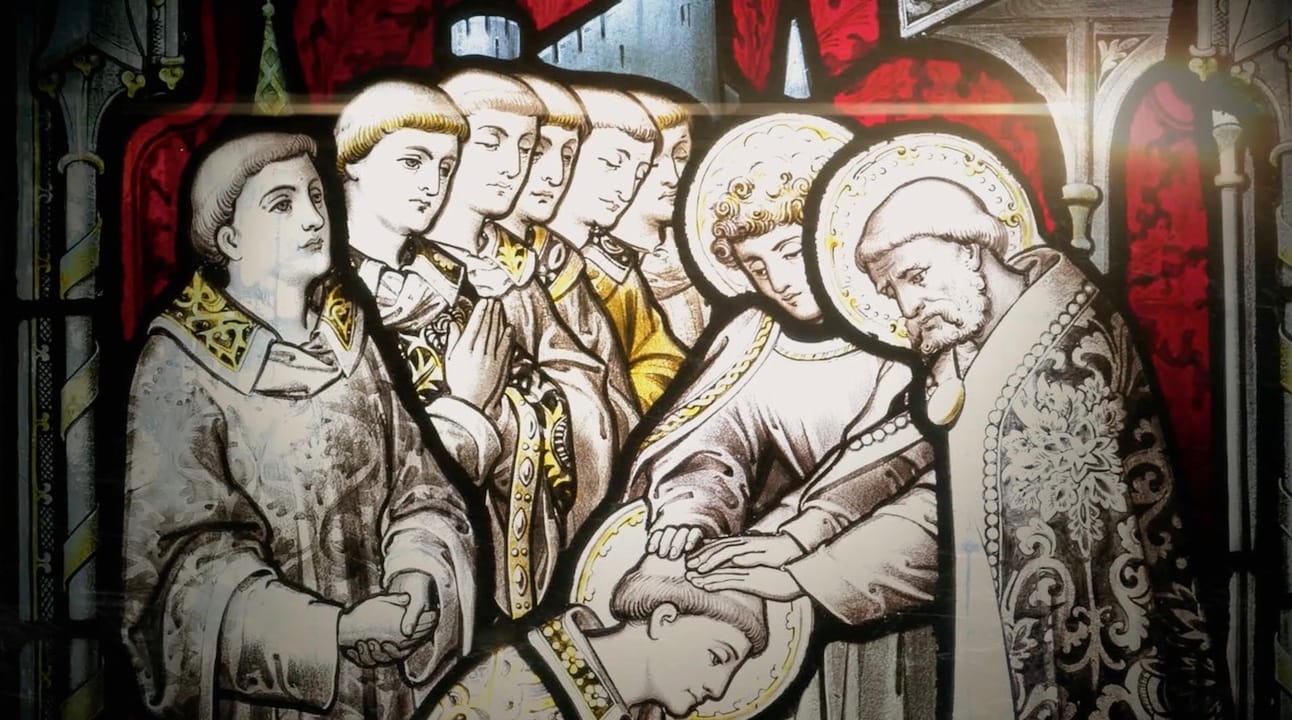
It's Saturday, March 30, 2024.
Today’s edition covers the online “Christ is King” controversy, the dating of Easter, the biblical significance of “laying on of hands,” and a smattering of other news of Christian interest.
Read critically. 💡 And enjoy!
Of Christian Concern
THE “CHRIST IS KING” CONTROVERSY, EXPLAINED

Screenshot: X
A controversy erupted online this week over the phrase “Christ is King,” after cultural commentator Candace Owens and conservative outlet The Daily Wire parted ways last week. Here’s what happened.
Background
Owens joined The Daily Wire in 2021 as a podcast host and content creator, but that relationship came to an end last week after several months of some public disagreements between her and the outlet’s co-founder Ben Shapiro.
The conflict—which was not their first—was over Owens’s response to the Hamas-Israel conflict, which some interpreted as being antisemitic, including her characterization of Israel’s actions in Gaza as “genocide.” The back-and-forth between Owens and Shapiro included a video of Shapiro calling her “behavior” “absolutely disgraceful” and “disreputable,” and spats on X in which some took Owens’s comments to be “an antisemitic dog-whistle.” In more than one of those posts, Owens included the phrase “Christ is King.”
Last Week
The Daily Wire co-founder and co-CEO Jeremy Boreing announced Owens’s parting from the outlet last Friday. In a podcast episode on the same day titled “Because Christ Really Is King,” another one of the company’s podcast hosts, Andrew Klavan, discussed her departure.
Klavan, a professing Christian, affirmed that “Christ is the king,” but argued that the declaration can be misused if it’s meant to imply that “God has abandoned His chosen people, the Jews...” If that’s how you use it, he says, “you are quoting Scripture like Satan does in the Bible.”
The Controversy
Over the weekend, the phrase “Christ is King” began trending on X, with debate about whether the statement is (or may be) antisemitic.
On Monday, Boreing (also a professing Christian) argued it is antisemitic “when it is used for the purpose of expressing antisemitism.” He gave the example of a shovel: “A shovel is not innately a murder weapon,” but it becomes one “When it is used to murder someone.” Likewise, “Saying ‘Christ is King’ is not innately antisemitic. It’s all about how a thing is used.” Also, he argued, using the phrase for evil is taking the Lord’s name in vain.
Some commenters disagreed, arguing, “No christian should ever feel inhibited in anyway in declaring that Christ is King,” suggesting Boreing was “tell[ing] Christians that they should be ashamed of their religion,” and implying his argument violated Shapiro's famous expression “facts don’t care about your feelings,” among other dissents.
Some expressed concern over letting bad actors hijack the declaration of Christ’s kingship. Boreing responded to this concern, himself declaring, “Christ is King, as I said in my post. Say it loud, say it proud - if what you mean is that Jesus Christ is King.”
Owens herself argued that those trying to “convince American Christians that the basic truth, ‘Christ is King’ is actually antisemitic” are doing so because “they hold contempt for Christianity.” In the same post, she said, “The reality is that Christ consciousness is rising throughout the world…” — For context, “Christ consciousness” is a New Age term.
Food For Thought
A question worth asking: is everyone who proclaims the words “Christ is King” a friend of Christ? The controversial figure Andrew Tate posted, “As a Muslim it warms my heart to see the resurgence of spirited Christian declarations. Christ is King.”
Also Noteworthy

Hot cross buns (Photo: Taryn Elliott)
→ Jeff Iorg, president of Gateway Seminary, has been elected as the new president of the Southern Baptist Convention”s Executive Committee.
→ American missionary Jill Dolan and four of her children were rescued after 24 days of being stuck in Port au Prince, Haiti due to the uprising of gang violence. They touched down in Florida around 9:00pm on March 23.
→ A number of major chains across the nation will close on Sunday to allow their employees to observe Easter, including TJ Maxx, Marshalls, HomeGoods, HomeSense, Costco, Sam’s Club, Target, Publix, Macy’s, H-E-B, and Lowe’s.
→ A UK supermarket called Iceland caused controversy for upsetting an Easter-time tradition by offering hot cross buns with checkmarks instead of crosses.
→ Both Utah and West Virginia pass laws aimed at protecting religious freedom.
→ Texas Attorney General Ken Paxton sues porn companies for violating the state’s age-verification law.
Church History Tidbit
The Dating of Easter

Photo: Leeloo The First
In the earliest centuries after Christ’s earthly life, Christians began to collect extrabiblical traditions. One of those was the annual memorial of His resurrection, called Easter in English.
Why is Easter celebrated when it is?
While the date of Easter is often taken for granted today, it was a major debate in the early church, known as the Paschal controversies (coming from the Greek word for Easter, Pascha).
The first controversy was whether the memorial of Christ’s resurrection should be reckoned according to the Jewish calendar, or always on the first day of the week. Jesus was crucified the day after Passover and resurrected “on third day” (Matthew 17:23), which that year was “the first day of the week” (Luke 24:1)—but that’s not the case every year. So, before AD 325, different groups celebrated it differently:
Christians in Asia Minor observed Easter on the 16th of the Jewish month Nisan, two days after Passover (the 14th of Nisan), regardless of the day of the week.
Christians in the West opted instead for the Sunday after Passover.
The Sunday option eventually grew in popularity. Then, the Council of Nicea in 325 formally set the observation for the Sunday after the first full moon after the spring equinox (March 21). For that reason, Easter alternates falls on some Sunday between March 22 and April 25. (The Eastern Orthodox church still calculates it differently, making their Easter celebration later.)
Do you observe Easter according to the Council of Nicaea’s dating? Why or why not?
The Bible, Briefly
Milk: Laying On Of Hands

We’re studying “milk”—the six foundational topics of Christian doctrine (Hebrews 5:12-6:2), which the Bible presents in three pairs. Last week we saw that “instructions about washings” refers to baptisms. We continue that discussion now.
The “laying on of hands” refers to literally laying one’s hands on another person, with symbolic significance. As commentator Warren W. Wiersbe writes, it “symbolized the sharing of some blessing (Luke 24:50; Acts 19:6) or the setting apart of a person for ministry (1 Tim. 4:14).”
1. The sharing of some blessing
In the Greek scriptures (the New Testament), the are two blessings most often associated with the laying on of hands:
miraculous healing (Matthew 9:18; 19:13; Mark 5:23; 6:5; 7:32; 8:23, 25; 16:18; Luke 4:40; 13:13; Acts 9:12, 17; 28:8), and
the giving of the Holy Spirit (Acts 8:17-19; 9:17; 19:6; 2 Timothy 1:6)
In addition, there are instances in which the action implies some sort of blessing but the blessing is not specified (Matthew 19:15; Mark 10:16).
It’s a symbol
The fact that the laying on of hands is a symbol, and not the direct cause of any spiritual effect, is important to highlight.
Miraculous healings occur in the New Testament at times even without laying hands on the unwell person. Jesus is nowhere near Cornelius’ servant when He heals him (Matthew 8:5-13), Peter’s shadow passing over people heals them (Acts 5:15-16), and handkerchiefs or aprons that touched Paul’s skin are carried away to heal people (Acts 19:11-12).
The same is true of receiving the Holy Spirit. At times the Spirit was given through the laying on of hands (Acts 8:17-19; 9:17; 19:6; 2 Timothy 1:6), but not always. In at least one case, the Holy Spirit unexpectedly came on everyone who was listening to Peter preach, while he was still talking (Acts 10:44-45).
So, why even involve the laying on of hands? As the Bible Q&A website Got Questions helpfully points out, it “was a means of connecting the message with the messenger, or the spiritual gift with the gifted giver.” When miracles occurred, it was a “sign” to authenticate that the one performing the miracles was from God.
2. The setting apart of a person for ministry
The laying on of hands was sometimes an act of commissioning or recognizing someone as set apart for ministry (Acts 6:6; 13:3; 1 Timothy 4:14; 5:22). Significantly, this was not to be done lightly or recklessly: “Do not be hasty in the laying on of hands, nor take part in the sins of others; keep yourself pure” (1 Timothy 5:22).
This warning is given not because the laying on of hands has any power in itself, but because there are great spiritual dangers to putting an unqualified person into a leadership role (cf. 1 Timothy 3:6). As Got Questions also observes, “Laying on of hands is only used by God when it is done in agreement with God’s Word.”
Furthermore, while laying on of hands is clearly normative and significant (symbolically), there is no direct command in Scripture to commission a minister in this way.
To be continued…
P.S. Fun Fact: Laying hands on someone is also frequently used in the Bible as an idiom for hurting someone, especially in the context of seeking out the victim.* This is obviously not what the writer of Hebrews was referring to!
*Genesis 22:12; 37:22; Exodus 7:4; 24:11; Joshua 2:19; 2 Kings 11:16; 2 Chronicles 23:15; 29:23; Nehemiah 13:21; Esther 2:21; 3:6; 6:2; 8:7; 9:2; Job 41:8; Ezekiel 39:21; Matthew 26:50; Mark 14:46; Luke 20:19; 21:12; 22:53; John 7:30, 44; Acts 12:1; 21:27
What did you think of today’s briefing?


Know someone who would enjoy this?Please SHARE this newsletter




Have some feedback for me? Reply to this email with comments or suggestions. I’d love to hear from you!
Why "18:15"? The name Project 18:15 is based on Proverbs 18:15: “An intelligent heart acquires knowledge, and the ear of the wise seeks knowledge.” The aim is for this weekly email—a Christian news briefing, a Bible study, and a Church history lesson rolled into one—to be one way you keep abreast of current events and acquire knowledge you might not acquire elsewhere.
Unless otherwise indicated, all Scripture quotations are from The ESV® Bible (The Holy Bible, English Standard Version®), copyright © 2001 by Crossway, a publishing ministry of Good News Publishers. Used by permission. All rights reserved.

Copyright (C) " target="_blank">unsubscribe.
